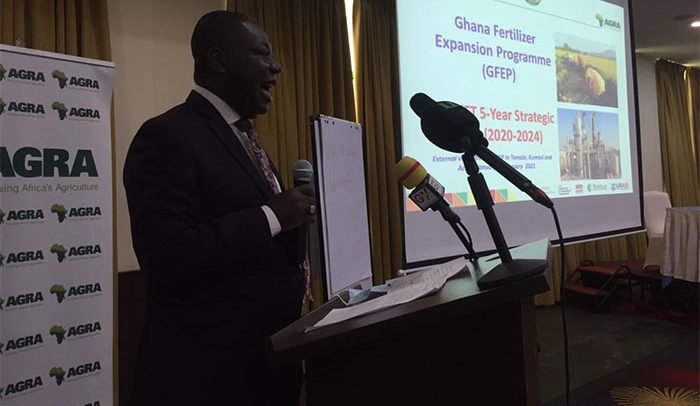Seth Osei-Akoto, Director of Crop Services, MoFA delivering a keynote address at the workshop
The Ministry of Food and Agriculture (MoFA) and the Alliance for Green Revolution in Africa (AGRA) have organized a validation workshop on the draft five year strategic plan of the Ghana Fertilizer Expansion Programme (GFEP).
The plan is for 2020 to 2024 and the GFEP seeks to among other things, integrate all fertilizer initiatives into a comprehensive program to boost fertilizer consumption to increase crop productivity, incomes and jobs.
The GFEP is aligned with the national fertilizer policy (2013).
It also seeks to develop a competitive fertilizer subsector that ensures environmentally sustainable agricultural production through timely distribution of adequate quantities of quality and affordable fertilizer products and dissemination of information on them.
The goal is to promote a viable agro-industrial economy, integrated fully into national development strategies for poverty reduction, competitiveness of agribusinesses, sustainable environmental management and industrial growth.
Delivering a keynote address at the workshop on Tuesday, February 2, 2021, on behalf of the Minister-designate for Food and Agriculture, Seth Osei Akoto, Director for Crop Services, MoFA, said “The justification for the Ghana Fertilizer Expansion Programme is very simple. Ghana has locally abundant natural gas resources,” he said.
“However, our natural gas is exported as raw materials for fertilizer production overseas, leading to subsequent importation of fertilizers back into the country.”
He bemoaned that despite the pressing need for increased fertilizer consumption, many African countries like Ghana are heavily dependent on fertilizer imports and subsidy programmes, making fertilizers expensive to both the Government and farmers and limiting its wide application to boost food and nutrition security.”
Thus, he observed that
with the existence of natural gas in Ghana, there was the need to ensure maximum investment in local fertilizer production to reduce Ghana’s dependence on fertilizer importation.
According to him, producing fertilizer in Ghana will be a major step in ensuring increased fertilizer accessibility, affordability and profitability to farmers.
West Africa Regional Head for AGRA, Forster Kwame Boateng told the media on the sidelines of the workshop that the blanket application of fertilizers across Africa was affecting farm yields.
He said in some cases where farmers in Europe were earning 10 tons yield on their farms, farmers in Africa were earning 1.5 tons.
AGRA is a farmer-centered, African-led, and partnerships-driven institution that is transforming Africa’s smallholder farming from a solitary struggle to survive to businesses that thrive.
By Melvin Tarlue


